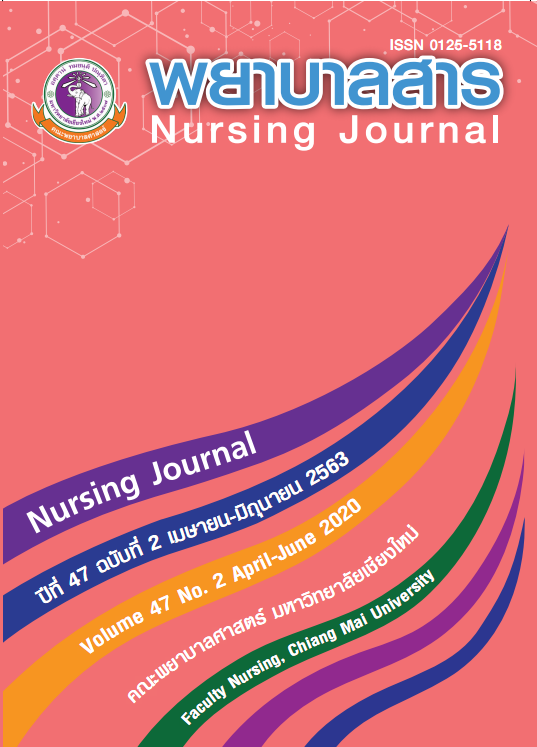Effects of Characteristic of a Peer Consulting Contemplative Education Theory Promotion Program in Second Year Nursing Students, Faculty of Nursing, Chiang Rai College.
Keywords:
Characteristics of peer consulting promotion program, Contemplative Education, Nursing studentsAbstract
The promotion of peer consulting characteristics according to contemplative education helps enhance the heart and wisdom of a consultant. It also turns a consultant himself into a medium that can effectively support those with mental disorders. This research was a quasi-experimental research with control and experimental groups. The objective was to explore the effects of the Peer Consulting Characteristics Promotion Program under the concept of contemplative education among second-year nursing students. Fifty-two nursing students were randomly selected by using a simple random sampling method: 26 students in the experimental group and 26 students in the control group. The study was conducted from March to May 2018. The experimental group was advised by the Peer Consulting Characteristics Promotion Program according to contemplative education, whereas the control group was advised by the standard program. The research instruments consisted of the Peer Consulting Characteristics Promotion Program according to contemplative education, personal information questionnaire, and the evaluation form of peer consulting characteristics according to contemplative education created from the review of literature with a reliability value of 0.91. The data were analyzed using descriptive statistics and t-test statistics.
The findings suggested that the mean scores of peer consulting characteristics in various aspects, including consulting knowledge, consulting attitudes, and consultants’ personality were higher in the experimental group than in the control group. In addition, after receiving the program, the experimental group obtained higher scores in the post-experimental test, with a statistical significance of 0.05.
The results indicated that the promotion of peer consulting characteristics according to contemplative education program could help promote the characteristics of peer consultants among nursing students, while they can also provide advice to fellow friends. As a result, the program shall be introduced as an extracurricular activity of the Faculty of Nursing to encourage the characteristics of peer consulting in a consistent and sustainable manner.
References
Burns, N., & Grove, S., (2009) The Practice of Nursing Research: Appraisal, Synthesis, and Generation of Evidence (6 th ed.). St. Louis: W. B. Saunders.
Chiddee, K., & Uthaithum, N., (2013). Contemplative Education activities: Personality development strategies for Student Nurses. Princess of Naradhiwas University Journal, 5(2), 106-117. (In Thai)
Jantakoon, J. (2017). The Effect of Learning Activites Based on Contemplative Education Approach on the Development of Local Curriculum of University of Phayao Student Teachers’ Competency. Journal of Community Development Research (Humanisties and Social Sciences), 10 (4), 186-199. (In Thai)
Jantaweemuang, V., Balthip, K., & Petchruschatachart, U. (2018). Effect of ContemplativeEducation Program on spiritual well-being of Nursing Students. Journal of Nursing, Siam University, 19(37), 84-102. (In Thai)
Julrat, P. (2010). The effect of contemplation learning process on learning achiev ement and happiness in study of graduate students faculty of education Sr inakharinwirot University (Research report). Bangkok: Srinakharinwirot University. (In Thai)
Kaewkanta, P. (2015). Prevalence of depression in higher education student in Chiangrai province. Nursing Journal, 42 (4), 48-64. (In Thai)
Khampakdee, S., & Rerkjaree, S. (2017). The effect of activities base on contemplative education on serenity of new staffs in khonkaen rajanakarindra psychiatri c hospital. Journal of Education Graduate Studies Research, 11 (4), 205-216.(In Thai)
Kolb, D. A., Rubin, I. M., & Osland, J. S. (1991). Organizational Behavior An Experiential approach (5 th ed.). Engle weed: Prentice hall.
Nilchaigowit, T., & Jantorn, A. (2009). The art of learning process for changing: Contemplation process Guide. Bangkok: Mahidol University Contemplative Education Center. (In Thai)
Nozawa, A. (2004). Contemplative Practices in Teacher Education. Journal of Inservice Education, 20, 179-192.
Onsri, P. (2014). Contemplative Education: Education for human development in 21 st century. Journal of The Royal Thai Army Nurses, 15 (1), 7-11. (In Thai)
Pensuksan, C., Suwanno, J., & Tantayothai, W. (2012). Stress, Coping strategies and Happiness of first year Nursing Student. Ramathibodi Nursing journal, 2 (8), 90-109. (In Thai)
Polit, D. F., & Hungler, B. P. (1999). Nursing research principle and method (6th ed.). Philadelphia: Lippicott William & Wilinks.
Supwirapakorn, W. (2012) .The development of characteristic of youth peer counselor for lower secondary school students in a boarding-school at Chonburi prov ince. Education Journal, 23 (2), 204-218. (In Thai)
Tranformative learning Monograph Mahidol University Contemplative Education Center. (2009).What is contemplative education. Nakhon Pathom: Mahidol University. Contemplative Education Center. (In Thai)
Wasi, P. (2007). The human way in the 21st century: 019. (4th ed.). Bangkok: Academic book project of contemplation. (In Thai)
Downloads
Published
How to Cite
Issue
Section
License
บทความที่ได้รับการตีพิมพ์เป็นลิขสิทธิ์ของวารสารพยาบาลสาร
ข้อความที่ปรากฏในบทความแต่ละเรื่องในวารสารวิชาการเล่มนี้เป็นความคิดเห็นส่วนตัวของผู้เขียนแต่ละท่านไม่เกี่ยวข้องกับมหาวิทยาลัยเชียงใหม่ และคณาจารย์ท่านอื่นๆในมหาวิทยาลัยฯ แต่อย่างใด ความรับผิดชอบองค์ประกอบทั้งหมดของบทความแต่ละเรื่องเป็นของผู้เขียนแต่ละท่าน หากมีความผิดพลาดใด ๆ ผู้เขียนแต่ละท่านจะรับผิดชอบบทความของตนเองแต่ผู้เดียว






